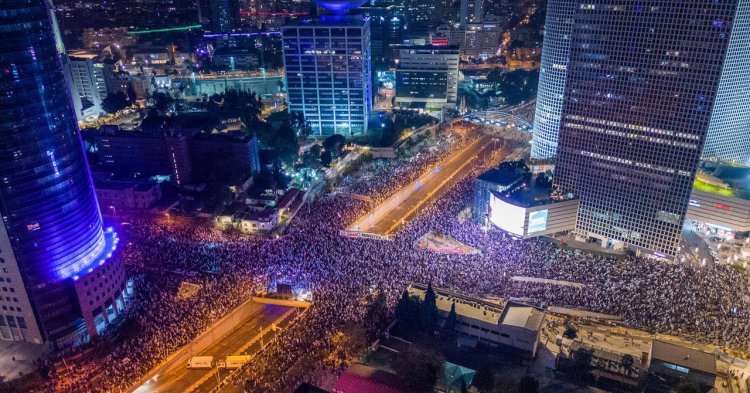Israel may be a Middle Eastern country, but around 50 percent of its population is of European descent, mainly Jewish people who escaped prosecution in Europe. Accordingly, from its inception in 1948, Israel saw itself as a liberal democratic country and attempted to adopt European models of governance. This so called “only democracy in the Middle East” was always under significant pressure due to the prolonged conflict with the Palestinians, a military occupation, and human rights violations.
After the international recognition of its borders, a vibrant democracy emerged. With peaceful transitions of power, freedom of speech, mass demonstrations over political, social, moral and religious issues and free elections. This led Freedom House to declare Israel as a “free” country in their index, and also resulted in economic growth, consumer confidence, and close relations with the EU and the US.
Since 2009, the almost continuous ruler of Israel has been Prime Minister Benjamin Netanyahu, initially a self-declared liberal center-right politician, he has been increasingly dogged by accusations of corruption and authoritarianism, impacted by ongoing investigations and boycotted by potential partners from the political center. Netanyahu has increasingly turned to the far-right and ultra-religious Jewish parties for political support. This culminated five months ago in the establishment of a new government which includes an openly racist party called “Jewish Power”.
This new government has sought a confrontational approach towards any mechanisms and breaks which preserve the rule of law and hinder their radical policies. Such policies include forced enforcement of Jewish dietary laws in Holidays, prohibition on the waving of Palestinian symbols, designation of NGOs as “foreign agents” and further violations of international law in the occupied territories. Specifically, the government proposed a plan to take over the judiciary by amending the composition of the committee which appoints judges, giving the ruling coalition an automatic majority. Further, the plan would almost completely eliminate the powers of the courts to conduct judicial review of government acts and bills, providing the government with almost unlimited authority.
Those proposed reforms are inspired by similar changes which were rammed through the legislature by right wing populist regimes in Hungary and Poland, with Israeli government officials openly supporting the “illiberal democracy” governance model of Hungary. If they pass, it will be very unlikely that the government could be replaced in future elections. Further, providing it with such unlimited power could eventually lead to policies of armed escalation with Israel’s neighbors, and thus to a regional war.
How could such a radical government even come to power in the first place? Well, for a start, they have not disclosed their regime change plans prior to the elections. Further, the governing parties relied on a campaign of ethnic incitement, identitarian motives, and ultra nationalist qualms against neighboring countries to convince 48% of the population to vote for them. With unfortunate splitting of the liberal political camp. Two parties failed to enter parliament, thus giving the right wing coalition a parliamentary majority.
Fortunately, not all is bleak. The government seemed to expect that, coming right after the elections, the reforms would meet a docile and demoralized opposition. What happened next surprised them and even veteran observers of Israeli politics. Protests have started, with hundreds of protesters in the first weeks that have quickly escalated to hundreds of thousands. Last Saturday, a full 5% of Israeli adult population protested, according to organizers. The protests also increased in intensity, blocking major roads, demonstrating outside of MPs homes, overpowering police barricades, and have spread to the army, judiciary, and other administrative, political, and economic elites.
Currently, the government presses on, and has rebuffed several attempts at compromise. However, parliament members from the coalition are wavering on their support of the new laws, and there is a possibility that the Supreme Court will strike down the changes. However this will develop, the Israeli democracy movement has been rejuvenated and will continue to fight for human rights, separation of power, and against the “Hungarization” of our government structures.
As I wrote in a recent Politico Piece on the topic, I call on Europeans to voice and express solidarity with the Israeli democracy movement, and join protests happening all around the continent, including a recent protest in front of the European Parliament and a large rally against Netanyahu’s visit in Berlin. The deep bonds between Israel and Europe gave birth to a vibrant (albeit flawed) democracy, which is worth preservation and a stubborn struggle. Further, this calls further attention to the dangers of autocratic methods and philosophies spreading from country to country, and the need to tackle this problem globally.


Follow the comments: |
|
